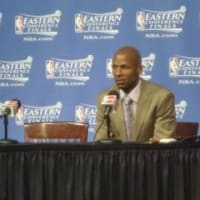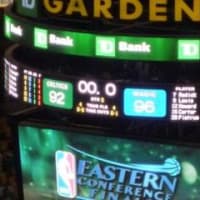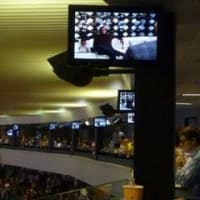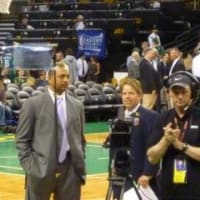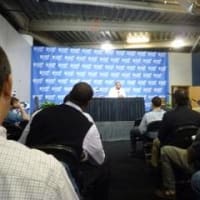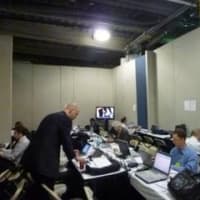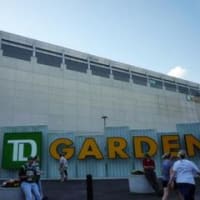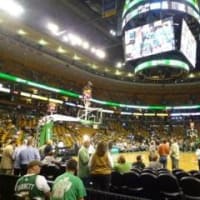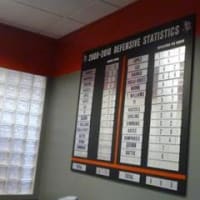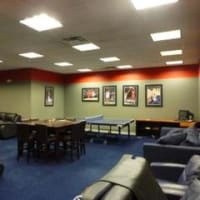先週土曜日のWall Street Journalに興味深い記事が出ていた。ファイナルに進出したセルティックスのオーナーに名を連ねているのは、ヘッジファンド、ベンチャーキャピタル、プライベートエクイティファンドなど、金融界の著名人達で、彼らがチームの経営にも好影響を及ぼしている、と。
Band of Financiers Brings Luck to Celtics
For Team Owners, Returns Take Back-Row Seat to Thrill
By PETER LATTMAN
May 31, 2008; Page B1
BOSTON -- As a kid growing up in Boston's North End, hedge-fund manager James Pallotta sneaked into Celtics basketball games. Today, Mr. Pallotta owns a piece of the team, and at Wednesday night's Eastern Conference finals, he was barking at referees from his $1,400 front-row seat.
"How is that not goaltending?" yelled Mr. Pallotta.
Pro sports teams have historically been the domain of oil magnates, beer barons and chewing-gum kings. The Celtics are the team the finance guys built. Nearly to a man, each of the ownership syndicate's roughly 25 members made his fortune in private equity, venture capital or hedge funds.
The group includes Mr. Pallotta, who runs the $8 billion Raptor hedge fund for Tudor Investment Corp.; David Bonderman, a founder of buyout shop TPG who recently led a $7 billion investment into thrift Washington Mutual Inc.; Jim Breyer, a venture capitalist at Accel Partners who was an early investor in Facebook; and six managing directors at Bain Capital Partners, the Boston buyout firm.
The owners, who coughed up an average of $10 million each, dubbed themselves Banner 17, a show of their ambitions for the Celtics 17th NBA title and its first in 22 years.
The roster of investing heavyweights makes it "the most amazing ownership group I've ever seen," said Robert Kraft, who owns football's New England Patriots.
They are a motley bunch, sometimes competing directly against one another for deals. Each has varying opinions on what their stake represents. A number view themselves as trustees of a Boston institution. Others admit that as an investment, the Celtics wouldn't stand up to their own firms' investing criteria.
That said, the group boasts of applying private-equity techniques to the team. A key investment tenet: Hire good managers, and stand by them in good times and bad. When the Celtics had the second-worst record in the NBA during the 2006-07 season, the owners rebuffed Boston fans and talk-show hosts who called for the jobs of coach Doc Rivers and general manager Danny Ainge.
Last summer, Mr. Ainge orchestrated two blockbuster off-season trades, bringing in All-Stars Kevin Garnett and Ray Allen. In a historic turnabout, the Celtics finished the season with the best record in the NBA and won the conference championship on Friday. Corporate sponsorships and ticket sales have increased, and revenues are up about 35% since 2002, according to people familiar with the matter.
But at its heart, ownership is still big-ticket fantasy sports camp. That's the case for Stephen Pagliuca, a Bain Capital managing director who once rode the pine for Duke University's freshman basketball team.
Two hours before Wednesday night's game, Mr. Pagliuca was pacing around the gym at a Celtics facility in Waltham, Mass. Outfitted in a suit and dress shoes, he demonstrated a decent set shot from the top of the key. He was soon short of breath. "I gotta get back in shape," he said.
Mr. Pagliuca, venture capitalist Wycliffe "Wyc" Grousbeck and his father Irving Grousbeck acquired the Celtics for $360 million in 2002. They then sold off pieces of the team, working their network of elite contacts built up over decades. Paging through the ownership roster, it's hard to tell the difference between personal and the business relationships.
One of Mr. Grousbeck's first calls was to Mr. Breyer, the Silicon Valley venture capitalist. The two had attended grade school together in the Boston suburbs but hadn't stayed in close touch. Mr. Breyer also had a newspaper route and delivered Sunday's Boston Globe to the Grousbeck family.
TPG's Mr. Bonderman was brought into the fold by Mr. Pagliuca. The two first met when Mr. Pagliuca worked as a consultant for Mr. Bonderman in the 1980s. Now they do deals together. They sit together on the board of Burger King, a successful investment for TPG and Bain.
Well-heeled Celtics fans are still buying in. Last November, Harrah's Entertainment Chief Executive Gary Loveman acquired a stake. At Harrah's board meetings, Mr. Loveman can sit next to his fellow Celtics owner Mr. Bonderman, who, along with Apollo Management LP, took Harrah's private in January. TPG and Apollo will miss out on revenue from betting on Celtics games; the NBA demanded that, as a condition of accepting Mr. Loveman as an owner, the team be removed from Harrah's casinos' sports books.
Business and basketball often converge. In May, Scott Sperling, the Boston-based co-president of private-equity firm Thomas H. Lee Partners, ducked out to a Celtics playoff game. Mr. Sperling was in the thick of negotiations over THL and Bain Capital's contentious buyout of Clear Channel Communications Inc. Mr. Sperling asked Mr. Pagliuca if there was a quiet place where he could take a call, and Mr. Pagliuca set him up in one of the team's offices just off the floor.
"Other than missing most of the game and being interrupted a couple of times by Danny Ainge, it worked out great," said Mr. Sperling.
At most home games, Messrs. Grousbeck and Pagliuca sit in the front row on opposite sides of the court, entertaining family and friends. On Wednesday night, each of them had flown in their mothers for the game.
Mr. Pagliuca was also joined by five business-school classmates, a group that included Michael Fascitelli, the president of Vornado Realty Trust, and Robert Niehaus, chairman of the private-equity unit at investment bank Greenhill & Co.
Other guests this season have included Lloyd Blankfein and John Mack, the chief executives of Goldman Sachs Group Inc. and Morgan Stanley, respectively.
Is this good business or good fun? It depends who you ask. Earlier that night, Mr. Pallotta, the hedge-fund investor, described his investment philosophy above the din of the Boston crowd:
"Am I hoping for a return? Are you kidding me? I don't care if I ever get my money back. I used to sneak in when I was a kid. It's much better to be able to walk in through the front door."
記事を読んでいてビックリ。セルティックスのオーナーとして名前が挙がっているなかの一人に、実は仕事で過去にお会いしたことがあった。今思えば、背中にChampionship Bannerがひるがえっているかのような、それはそれは威厳のある方だった。あの時これを知ってたら、「セルティックスファンです」くらいのリップサービスはしたのにな。
実はセルティックスはNBAの中でも数少ない、経営にスタッツ分析を取り入れているチームのひとつ。スタッツの神様であるBill Jamesを招きいれたRedsoxといい、科学的な経営手法を進んで取り入れるあたりは、ボストンと言うアカデミックな土地柄によるものだろうか。
対照的にニューヨークは、スタッツ分析どころか、オーナーが実績の乏しい元名選手に経営・監督を任せ、結果チームがガタガタになったり(ニックス)、そもそも所有と経営の分離がきれいにできていなかったり(ヤンキース)と、うまくいっていないチームが目立つ。確かにニューヨークのギラギラした雰囲気の中では、「結局金持ってる奴(=オーナー)が偉い」という考えがまかり通っても仕方のない感じがする。
うーん、ボストンに一票。
Band of Financiers Brings Luck to Celtics
For Team Owners, Returns Take Back-Row Seat to Thrill
By PETER LATTMAN
May 31, 2008; Page B1
BOSTON -- As a kid growing up in Boston's North End, hedge-fund manager James Pallotta sneaked into Celtics basketball games. Today, Mr. Pallotta owns a piece of the team, and at Wednesday night's Eastern Conference finals, he was barking at referees from his $1,400 front-row seat.
"How is that not goaltending?" yelled Mr. Pallotta.
Pro sports teams have historically been the domain of oil magnates, beer barons and chewing-gum kings. The Celtics are the team the finance guys built. Nearly to a man, each of the ownership syndicate's roughly 25 members made his fortune in private equity, venture capital or hedge funds.
The group includes Mr. Pallotta, who runs the $8 billion Raptor hedge fund for Tudor Investment Corp.; David Bonderman, a founder of buyout shop TPG who recently led a $7 billion investment into thrift Washington Mutual Inc.; Jim Breyer, a venture capitalist at Accel Partners who was an early investor in Facebook; and six managing directors at Bain Capital Partners, the Boston buyout firm.
The owners, who coughed up an average of $10 million each, dubbed themselves Banner 17, a show of their ambitions for the Celtics 17th NBA title and its first in 22 years.
The roster of investing heavyweights makes it "the most amazing ownership group I've ever seen," said Robert Kraft, who owns football's New England Patriots.
They are a motley bunch, sometimes competing directly against one another for deals. Each has varying opinions on what their stake represents. A number view themselves as trustees of a Boston institution. Others admit that as an investment, the Celtics wouldn't stand up to their own firms' investing criteria.
That said, the group boasts of applying private-equity techniques to the team. A key investment tenet: Hire good managers, and stand by them in good times and bad. When the Celtics had the second-worst record in the NBA during the 2006-07 season, the owners rebuffed Boston fans and talk-show hosts who called for the jobs of coach Doc Rivers and general manager Danny Ainge.
Last summer, Mr. Ainge orchestrated two blockbuster off-season trades, bringing in All-Stars Kevin Garnett and Ray Allen. In a historic turnabout, the Celtics finished the season with the best record in the NBA and won the conference championship on Friday. Corporate sponsorships and ticket sales have increased, and revenues are up about 35% since 2002, according to people familiar with the matter.
But at its heart, ownership is still big-ticket fantasy sports camp. That's the case for Stephen Pagliuca, a Bain Capital managing director who once rode the pine for Duke University's freshman basketball team.
Two hours before Wednesday night's game, Mr. Pagliuca was pacing around the gym at a Celtics facility in Waltham, Mass. Outfitted in a suit and dress shoes, he demonstrated a decent set shot from the top of the key. He was soon short of breath. "I gotta get back in shape," he said.
Mr. Pagliuca, venture capitalist Wycliffe "Wyc" Grousbeck and his father Irving Grousbeck acquired the Celtics for $360 million in 2002. They then sold off pieces of the team, working their network of elite contacts built up over decades. Paging through the ownership roster, it's hard to tell the difference between personal and the business relationships.
One of Mr. Grousbeck's first calls was to Mr. Breyer, the Silicon Valley venture capitalist. The two had attended grade school together in the Boston suburbs but hadn't stayed in close touch. Mr. Breyer also had a newspaper route and delivered Sunday's Boston Globe to the Grousbeck family.
TPG's Mr. Bonderman was brought into the fold by Mr. Pagliuca. The two first met when Mr. Pagliuca worked as a consultant for Mr. Bonderman in the 1980s. Now they do deals together. They sit together on the board of Burger King, a successful investment for TPG and Bain.
Well-heeled Celtics fans are still buying in. Last November, Harrah's Entertainment Chief Executive Gary Loveman acquired a stake. At Harrah's board meetings, Mr. Loveman can sit next to his fellow Celtics owner Mr. Bonderman, who, along with Apollo Management LP, took Harrah's private in January. TPG and Apollo will miss out on revenue from betting on Celtics games; the NBA demanded that, as a condition of accepting Mr. Loveman as an owner, the team be removed from Harrah's casinos' sports books.
Business and basketball often converge. In May, Scott Sperling, the Boston-based co-president of private-equity firm Thomas H. Lee Partners, ducked out to a Celtics playoff game. Mr. Sperling was in the thick of negotiations over THL and Bain Capital's contentious buyout of Clear Channel Communications Inc. Mr. Sperling asked Mr. Pagliuca if there was a quiet place where he could take a call, and Mr. Pagliuca set him up in one of the team's offices just off the floor.
"Other than missing most of the game and being interrupted a couple of times by Danny Ainge, it worked out great," said Mr. Sperling.
At most home games, Messrs. Grousbeck and Pagliuca sit in the front row on opposite sides of the court, entertaining family and friends. On Wednesday night, each of them had flown in their mothers for the game.
Mr. Pagliuca was also joined by five business-school classmates, a group that included Michael Fascitelli, the president of Vornado Realty Trust, and Robert Niehaus, chairman of the private-equity unit at investment bank Greenhill & Co.
Other guests this season have included Lloyd Blankfein and John Mack, the chief executives of Goldman Sachs Group Inc. and Morgan Stanley, respectively.
Is this good business or good fun? It depends who you ask. Earlier that night, Mr. Pallotta, the hedge-fund investor, described his investment philosophy above the din of the Boston crowd:
"Am I hoping for a return? Are you kidding me? I don't care if I ever get my money back. I used to sneak in when I was a kid. It's much better to be able to walk in through the front door."
記事を読んでいてビックリ。セルティックスのオーナーとして名前が挙がっているなかの一人に、実は仕事で過去にお会いしたことがあった。今思えば、背中にChampionship Bannerがひるがえっているかのような、それはそれは威厳のある方だった。あの時これを知ってたら、「セルティックスファンです」くらいのリップサービスはしたのにな。
実はセルティックスはNBAの中でも数少ない、経営にスタッツ分析を取り入れているチームのひとつ。スタッツの神様であるBill Jamesを招きいれたRedsoxといい、科学的な経営手法を進んで取り入れるあたりは、ボストンと言うアカデミックな土地柄によるものだろうか。
対照的にニューヨークは、スタッツ分析どころか、オーナーが実績の乏しい元名選手に経営・監督を任せ、結果チームがガタガタになったり(ニックス)、そもそも所有と経営の分離がきれいにできていなかったり(ヤンキース)と、うまくいっていないチームが目立つ。確かにニューヨークのギラギラした雰囲気の中では、「結局金持ってる奴(=オーナー)が偉い」という考えがまかり通っても仕方のない感じがする。
うーん、ボストンに一票。










